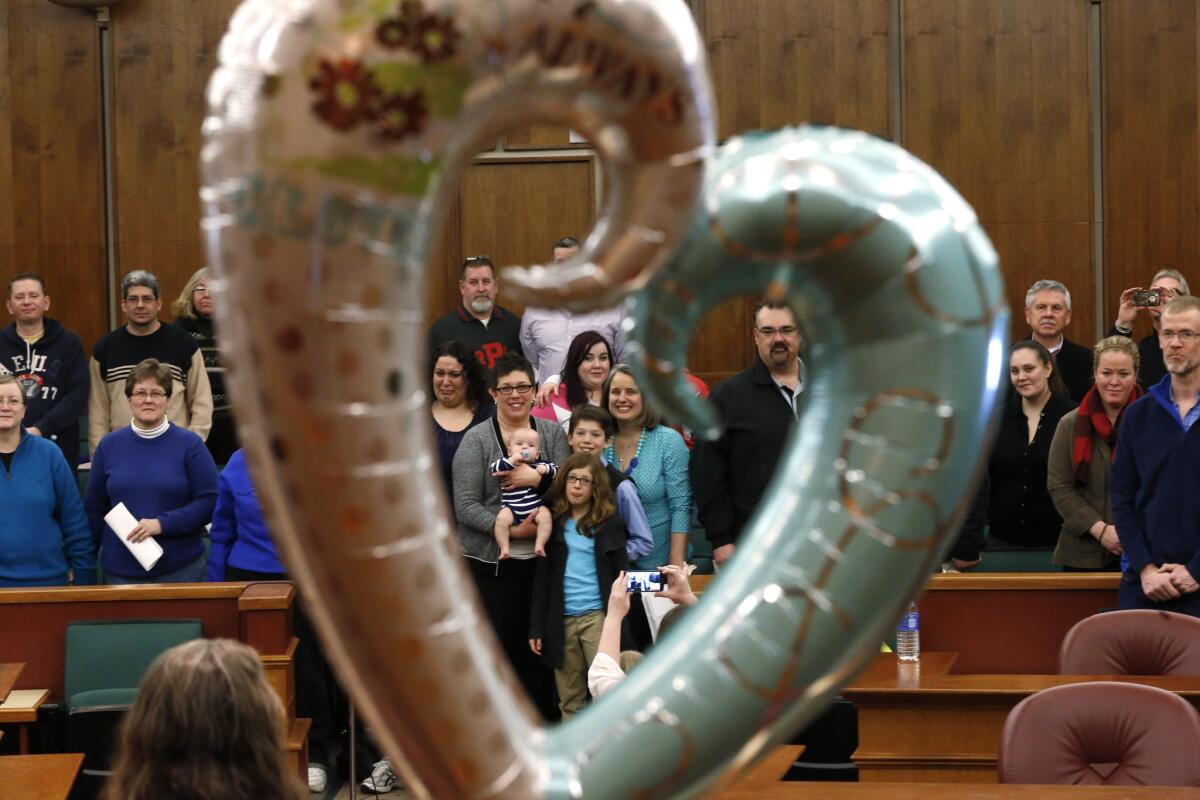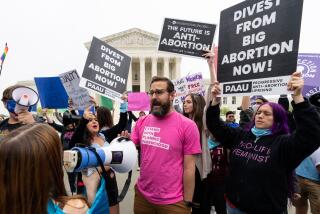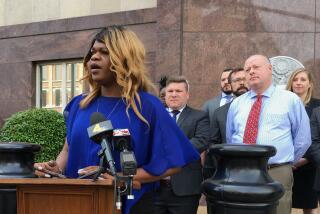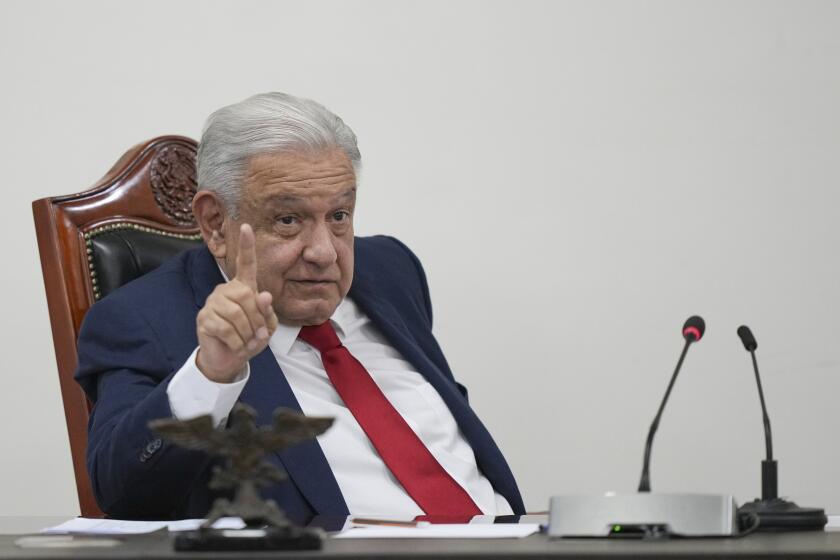Federal court takes up gay marriage cases from 4 states

A federal appeals panel in Cincinnati heard arguments Wednesday from six same-sex marriage cases that have worked their way through the courts in Michigan, Ohio, Kentucky and Tennessee.
In all six cases, judges in lower courts have affirmed gay rights by either striking down state bans on same-sex marriage or by requiring state governments to recognize the rights of gay couples who were married in states where such marriages are legal.
In two of the cases, the U.S. 6th Circuit Court of Appeals will have to decide whether to uphold same-sex marriage bans in Michigan and Kentucky that were approved by voters in 2004. In the other cases, the court will rule on whether Ohio, Tennessee and Kentucky should have to recognize the rights of same-sex couples who were married in states where gay marriages are legal.
Judges Jeffrey S. Sutton and Deborah L. Cook, both appointed by President George W. Bush, and Martha Craig Daughtrey, who was appointed by President Clinton, peppered the attorneys with questions throughout the day, with each state having its turn. Audio of the proceedings was streamed by the court.
Daughtrey seemed to make it clear how she was leaning, at one point saying that since 18 states and Washington, D.C., followed Massachusetts in legalizing same-sex marriage, “it doesn’t look like the sky has fallen.”
Sutton and Cook gave less indication, frequently challenging lawyers from both sides of each case, but suggesting at various times that deference should be given to voters who supported same-sex bans in Michigan and Kentucky.
“Maybe there’s something I’m missing, but I would have thought that the best way to get respect and dignity is through the democratic process,” Sutton said. Cook agreed, commenting that court intervention in the issue “disparages the voters of Michigan.”
Attorneys from both sides in the Michigan and Ohio cases went first, each having 30 minutes to argue. Then lawyers from the Kentucky and Tennessee cases followed, having 15 minutes each.
The first arguments were from a Michigan lawsuit in which one lesbian couple were unable to jointly adopt their three children under the state’s gay marriage ban. The state’s ban was struck down by U.S. District Judge Bernard Friedman in March.
Michigan’s solicitor general, Aaron Lindstrom, defended the state’s 2004 vote by arguing that changes in law should come “not through the courts, but through the people.”
“The most basic right we have as a people is to decide public policy questions on our own,” Lindstrom said. He also argued that there had not been comprehensive studies to show how children raised by same-sex couples fared.
Attorney Carole Stanyar, representing the Michigan plaintiffs, argued that “fundamental constitutional rights may not be submitted to popular vote” and that “the Michigan marriage amendment gutted the democratic process.”
Stanyar also argued that under Michigan law, gays and lesbians are allowed to adopt children and that adoptive parents are allowed the same rights as biological parents, so therefore the ban shouldn’t apply to adoptive parents just because they are a same-sex couple.
Ohio, which has two cases, was up next. Both cases involve the recognition of marriage rights for couples who were married out of state. One involves two gay men who sued to be listed as the surviving spouses on their dying husbands’ death certificates. In the other lawsuit, three lesbian and one gay couple sued for the right for both spouses to be on their children’s birth certificates. U.S. District Judge Timothy S. Black ruled against the state in both cases in December and April, but the orders were stayed pending appeal.
Solicitor Gen. Eric Murphy argued that such a change could raise implementation issues.
When asked by Sutton to detail such issues, Murphy said a legislative response would be needed to do things such as change wording on birth certificates from “a father and mother” to “parent one and parent two.”
“There’s no doubt that it would require new laws being passed,” Murphy said.
“Or forms being reprinted, perhaps,” Daughtrey said.
Cincinnati attorney Alphonse Gerhardstein, who represented plaintiffs in both Ohio cases who were married outside the state, said the ban was “developing a second tier of marriages.”
“The deal that these couples made is they were married in states where it was legal, and they had a reasonable expectation that their marriages would be transported from one state to another,” Gerhardstein said.
Two cases were heard from Kentucky. One was filed by three couples last year seeking to have their marriages from other states recognized by Kentucky, and in July, U.S. District Judge John G. Heyburn agreed. The second case involves Kentucky’s ban on gay marriage, which was struck down by the same judge in February. Both rulings are on hold pending appeal.
While lawyers for the plaintiffs argued that the state has no rational reason to prohibit same-sex couples from getting married, the state’s attorneys said Kentucky has an economic interest in married couples having children to maintain population stability. Daughtrey criticized this argument, calling it “circular logic.”
In the Tennessee case, three same-sex couples sued to be recognized on their children’s birth certificates. In March, U.S. District Judge Aleta Trauger issued an injunction against the state, blocking it from enforcing the gay marriage ban against the three couples, who were married in states where same-sex marriage is legal.
“No one can deny that marriage has other aspects, but they are not the reasons the Supreme Court identified it as a fundamental right,” said Tennessee acting Solicitor Gen. Joe Whalen, also arguing the economic and population point.
“There’s not a logical link between procreation and what these laws are attempting to do,” said Bill Harbison, who represented the plaintiffs. “They don’t further procreation.”
According to University of Richmond law professor Carl Tobias, this ruling could be pivotal. If the 6th Circuit decides against same-sex marriage, it would add pressure to the U.S. Supreme Court to settle the issue in its next session, which begins in October and ends in June, he said.
Federal appeals courts in Denver and Richmond, Va., have already ruled in favor of gay marriage, and on Tuesday, Utah appealed the Denver-based court’s ruling to the U.S. Supreme Court in hopes that it would uphold the state’s ban.
There was no indication when the 6th Circuit panel would issue a ruling.
maya.srikrishnan@latimes.com
More to Read
Sign up for Essential California
The most important California stories and recommendations in your inbox every morning.
You may occasionally receive promotional content from the Los Angeles Times.










